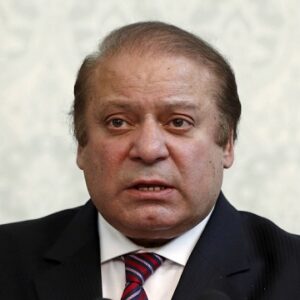Pakistan’s current Prime Minister, Mian Muhammad Nawaz Sharif, has been in power since 2013. He is a seasoned politician who has served as Prime Minister on two earlier occasions, from 1990 to 1993 and 1997 to 1999. He was born into a well-to-do family in Lahore, and after college, he joined his family’s business. His father established the Ittefaq Group of Industries, which is now a multibillion-dollar conglomerate with interests in steel, sugar, paper, and textiles. He was already a successful industrialist when he entered politics, and he used his keen administrative skills in his political career as well. When then-Prime Minister Zulfikar Ali Bhutto began implementing nationalization policies that threatened Sharif’s thriving family business, he entered politics. Initially, his main concern was to save his company, but he soon developed a strong interest in the country’s politics and chose to pursue a political career. Along with his political activity, he continued to focus on restoring his business. He intended to build an economy based on privatization and economic liberalization when he initially became Prime Minister in 1990, in order to pave the way for Pakistan’s rapid industrial development. In a coup led by then-Army Chief Pervez Musharraf in 1999, he was removed from power and exiled to Saudi Arabia. Nawaz Sharif, on the other hand, returned to Pakistan in 2007 and eventually reclaimed power in 2013.
Childhood and Adolescence
He was born in the Pakistani city of Lahore on December 25, 1949. Muhammad Sharif, his father, was a merchant and industrialist. Following India’s partition in 1947, his parents moved to Lahore from Amritsar. The Ittefaq Group of Industries was formed by his father.
He attended Saint Anthony High School for his elementary schooling before attending Government College University (GCU) and graduating with a degree in art and business. He then went to Punjab University’s Law College in Lahore and graduated with a law degree.
Career of Nawaz Sharif
After finishing his schooling, he went to work for his family’s firm, which was doing well. The Sharif family’s steel firm, however, was taken over by the government when Prime Minister Zulfikar Ali Bhutto imposed nationalization plans in 1972. His family was distraught by the loss of their successful company.
This infuriated young Nawaz, who resolved to enter politics in order to retrieve his lost business. He finally re-established his company, which became quite successful again.
In 1976, he joined the Pakistan Muslim League, and soon after, Ghulam Jilani Khan, the Punjab Province’s newly appointed Governor and a former Director-General of the Inter-Services Intelligence (ISI), named him as the province’s Finance Minister.
In 1981, Sharif joined General Zia-ul-Punjab Haq’s Advisory Board. He offered development-oriented budgets as Finance Minister, and the financial plans he enacted considerably aided the province’s growth and development.
Sharif was nominated for Chief Minister of Punjab by General Ghulam Jilani Khan in 1985. He easily won the 1985 elections and was elected Chief Minister of Punjab, a position he held for two terms. He became quite popular among the people as chief minister because he emphasized welfare and development operations.
Nawaz Sharif was elected Prime Minister of Pakistan in October 1990 and took office on November 1, 1990. He promised to minimize government corruption and focus on the country’s growth by strengthening Pakistan’s infrastructure.
He was a staunch supporter of capitalism, and as a result, he privatized government banks and encouraged increased industrialization. He introduced a number of programs aimed at promoting privatization and economic liberalization.
He believed that rapid industrialisation was the best option to produce more jobs and accelerate economic growth because unemployment was a serious issue in the country. As a result, he implemented policies aimed at accelerating industrialization, increasing private savings, and focusing on infrastructure development.
His popularity was rising, but his image suffered a setback following the revelation of the co-operative societies scandal, which resulted in the loss of thousands of Pakistanis’ savings. In 1993, he was compelled to resign.
In the 1997 legislative elections, he ran again and defeated incumbent Prime Minister Benazir Bhutto by a landslide. This tenure, however, was more challenging for him due to Pakistan’s serious economic challenges, which included massive foreign debt, rampant corruption, and an ongoing confrontation with India.
General Pervez Musharraf overthrew Sharif in a military coup in 1999, and he was tried on allegations of hijacking and terrorism. In a swift trial, the military court found him guilty and sentenced him to life in prison. On the advice of Saudi Arabia’s King Fahd, Sharif was sentenced to ten years in prison and then exiled to Saudi Arabia for ten years in exchange for his sentence being mitigated.
Following the deposition of Nawaz Sharif, General Pervez Musharraf gained power and became Pakistan’s President. Musharraf became unpopular over time, and when a Supreme Court decision in 2007 decided that Sharif was allowed to return to Pakistan, he took advantage of the opportunity.
Sharif staged a stunning political comeback in 2013, winning a third term as Prime Minister and being sworn in on June 7, 2013.
Major Projects of Nawaz Sharif
Despite great international criticism, Putin is attributed with conducting nuclear testing in May 1998 in reaction to Indian nuclear tests.
Personal History and Legacy
He is married to Kalsoom Butt, the daughter of a well-known physician and herself a well-educated woman. There are three children in the family: two sons and one daughter.


